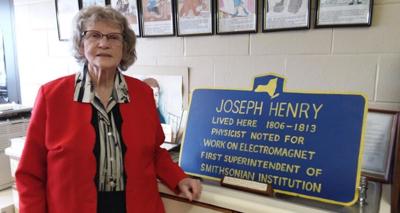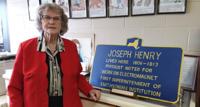GALWAY – When Phyllis Keeler became Galway town historian in 1969, she recalls the previous historian’s collection as consisting of “three pieces of paper and one listed burial plot.”
She immediately began collecting all she could on the history of this tiny Saratoga County town, once thriving enough to have a downtown stagecoach hotel — though the hotel burned down in a spectacular 1908 fire that destroyed Galway village.
For the last half-century, Keeler has kept collecting information on local families, organizations, war participants and school enrollments, to the point where a half-dozen filing cabinets in her office at the town complex are full of hundreds of files documenting aspects of Galway’s civic life. It’s all organized to the point where she can quickly lay her hands on almost anything when someone calls doing local or family research.
“The minute I became historian, I said to the community, ‘If you have to take care of mama’s or grandma’s house, any boxes with papers in them, bring them to me, don’t throw them away,” Keeler recalled. “And for the most part, people have.”
Old town and school records have been brought to her, too.
“I’m so grateful that the town when they were cleaning out things would bring them here, and we have a gold mine today,” Keeler said.
Keeler, a spry 84 years old, last weekend marked her 50th anniversary as town historian, making her among the longest-serving municipal historians in the state. It’s hard to say who might have been doing it longer, since such records are kept only informally by state historical organizations, but only one or two others have similar tenures.
This Wednesday, Keeler — who also taught at the Joseph Henry Elementary School for 32 years — will be recognized with an event at 7 p.m. in the Galway High School auditorium. There will be presentations from state Assemblywoman Mary Beth Walsh, R-Ballston, and state Sen. James Tedisco, R-Glenville, to be followed by refreshments.
“Phyllis is a great lady and has served the community well,” Town Supervisor Mike Smith said.
For non-historians, here are the basics: Galway was settled by Scottish immigrants who named it after the Galloway region of Scotland. It was frontier country until after the American Revolution. The first recorded settler birth occurred in 1774. It has always, to this day, had a strong agricultural culture.
In the 1950s, the U.S. government seized a thousand acres on the border with the town of Milton — including the ancestral farm of Keeler’s late husband, Earl — for the Kenneth A. Kesselring naval nuclear training site, but outside the base’s gates, the changes over the decades have been far more gradual.
Keeler was appointed town historian in November 1969, without any real background. She had already been teaching in Galway for about a decade, and when neighbor Everett Garrick was elected to town office, she called to offer her help, he called back to ask if she wanted to be historian.
“I said, ‘I don’t know much about it, but I can try,'” she recounted.
Keeler grew up Phyllis White in nearby Broadalbin, knowing from a very early age that she wanted to be a teacher. After high school, she attended what was then Oneonta State Teachers’ College. In Galway, she taught for a year in an old church while the Joseph Henry school was being built. It opened in 1960.
Keeler is a promoter of the legacy of Henry, the early 19th-century scientist and inventor who spent formative adolescent years in Galway, and who became the founding director of the Smithsonian Institute in Washington, D.C. Born in 1797 in Albany, he lived in Galway from 1806 to 1813.
Some time ago, Keeler recalled that a school project had students release balloons, each with a note inside asking the finder to write back to the student and ask who Joseph Henry was. Sure enough, there were replies, she said. The students would then write back — it was part of an English assignment — and fill their correspondent in on Henry’s life.
Keeler started accumulating records as soon as she took office. But her office remained in her home for the next 28 years.
“I had all this in my home, boxes and boxes,” Keeler said. “I was thinking, ‘What if something happened?’ “
So one day she and an assistant gathered some of the boxes and quietly moved them into a room at the Town Hall. Then-town Supervisor George Hargrave wasn’t pleased and told her they couldn’t stay, she recalled.
She told Hargrave she needed an office. She smiled, and didn’t budge, and there was a standoff for a couple of days.
“I was patient and kind, but I wouldn’t give up until I had that room,” Keeler said.
Within a few days, the Town Board found Keeler a permanent spot: It gave her the former break room and office in the town highway department’s auxiliary garage. “They brought me a desk and a table, and for me it was like Christmas morning,” Keeler recalled with a smile. And there, 22 years later, she remains.
As recently as last year, she aided Boy Scout Eagle Scout candidate Eric Malanowsky with restoring the overgrown and rundown Mechanic Street Cemetery, and gave an impromptu interview to a Vermont television crew about a local barn that was being dismantled and moved to an agricultural education site.
“People ask, ‘Don’t you get tired of it?'” Keeler said. “No. I get so excited for people. If I can help them find something, I’m happy.”
While not every community has some with the dedication and ongoing enthusiasm of Keeler, every community has a historian.
There are more than 1,600 local government historians in New York. State law requires that a local historian is appointed in each city, town, village, or borough, and allows for the appointment of a historian in each county. Most do the job part-time, in many cases putting in far more hours than their salary would justify. Keeler, for example, makes about $2,000 per year.
“I would do it if I didn’t get paid,” she said. “Galway needs it. It’s a wonderful town.”
Saratoga County Historian Lauren Roberts said Keeler remains among the most active town historians in the county, even after so many years.
“She’s amazing, ” Roberts said. “She’s a great historian. She’s very active, and you see her all over the community.”
Reach Gazette reporter Stephen Williams at 518-395-3086, swilliams@dailygazette.net or @gazettesteve on Twitter.









